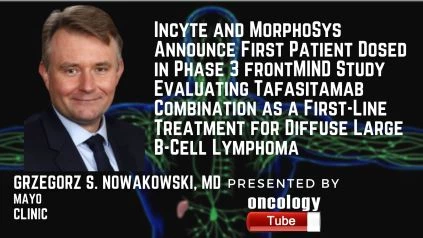Grzegorz S. Nowakowski, MD from the Mayo Clinic speaks about Incyte and MorphoSys Announce First Patient Dosed in Phase 3 frontMIND Study Evaluating Tafasitamab Combination as a First-Line Treatment for Diffuse Large B-Cell Lymphoma.
The first patient in the pivotal Phase 3 frontMIND study evaluating tafasitamab and lenalidomide in combination with rituximab, cyclophosphamide, doxorubicin, vincristine, and prednisone (R-CHOP) versus R-CHOP alone as first-line treatment for high-intermediate and high-risk patients with untreated diffuse large B-cell lymphoma was dosed today (DLBCL). Tafasitamab is a humanized monoclonal antibody that is used to target the B-cell specific antigen CD19 and activate immune cells.
In the United States alone, about 30,000 people are diagnosed with DLBCL each year1,2. R-CHOP is the current standard of therapy for individuals with previously untreated DLBCL, but roughly 40% of patients who get treatment do not respond or relapse – especially those with high-intermediate or high-risk disease3.
At the American Society of Hematology (ASH) Annual Meeting in December 2020, promising preliminary data from firstMIND, an ongoing Phase 1b, open-label, randomized study on the safety and efficacy of R-CHOP plus either tafasitamab or tafasitamab plus lenalidomide for patients with newly diagnosed DLBCL, were presented. In a patient group with a dismal prognosis, the findings indicated a preliminary response rate of 91.1 percent across both arms, indicating that the combination of tafasitamab, lenalidomide, and R-CHOP had an acceptable tolerability profile. These findings aided and encouraged the frontMIND study’s continued exploration of the tafasitamab combo.
Monjuvi® (tafasitamab-cxix) in combination with lenalidomide was approved by the FDA in July 2020 for the treatment of adult patients with relapsed or refractory DLBCL not otherwise specified, including DLBCL arising from low grade lymphoma, who are not candidates for autologous stem cell transplant (ASCT). Based on the total response rate, this indication is granted under rapid approval. Continued approval for this indication might be conditional on the confirmation and description of clinical benefit in the confirmatory trial(s)4.
The FDA decision marked the first time a second-line treatment for adult DLBCL patients who progressed during or after first-line therapy was approved.

